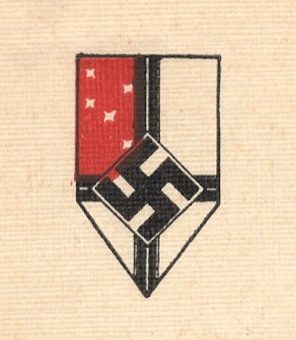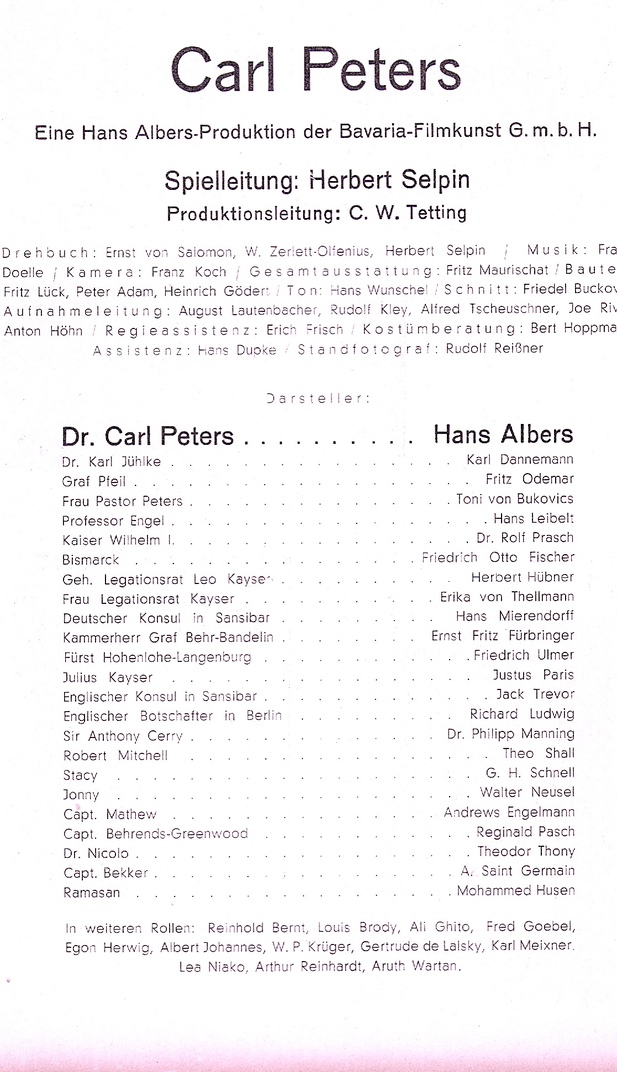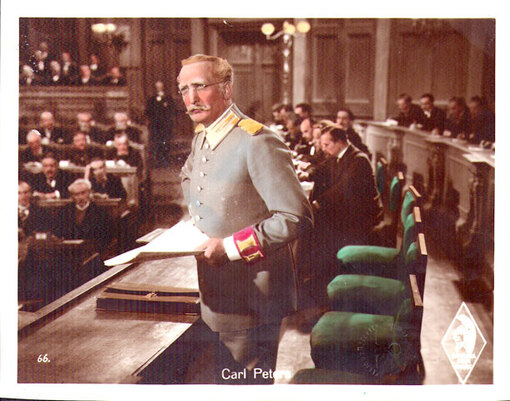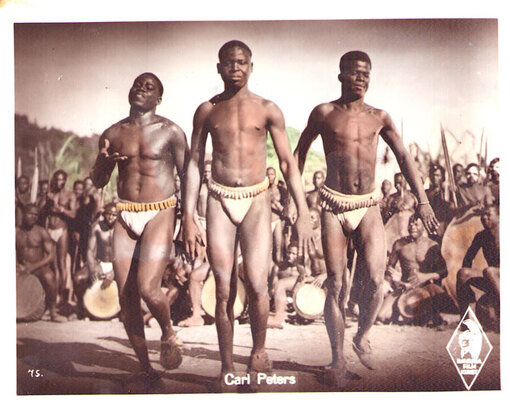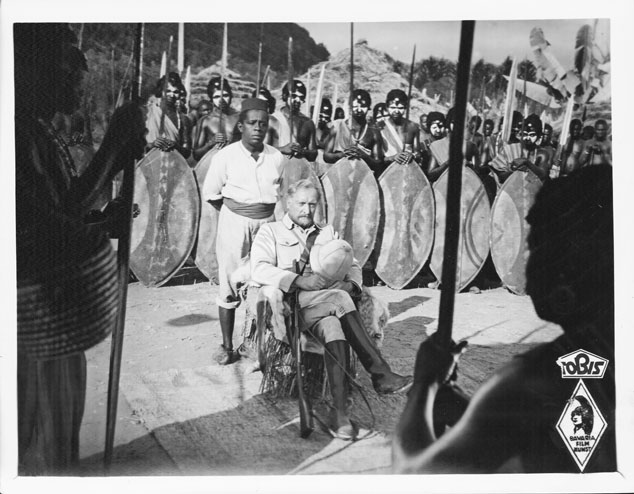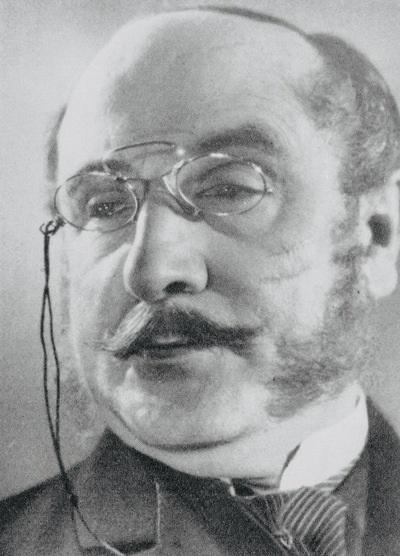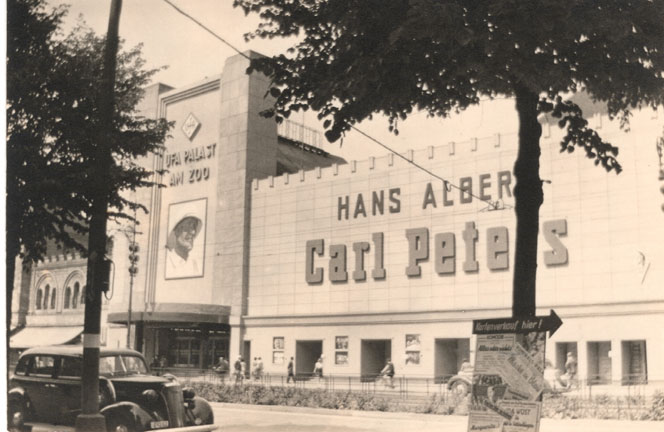- Home
- POSTER GALLERY
- ❗️BOOK & POSTER STORE❗️
- PURCHASE "HJ Quex" film ephemera HQ
- About the Posters
- The William Gillespie Collection
- Our Publishing House
- ❗️GFDN interviews author and collector William Gillespie ❗️
- Our most expensive & inexpensive finds!
- ❗️***NEW!**❗️POSTER OF THE MONTH - Blutzeugen / Raza
- ❗️NEW ❗️Film Posters – Demands on an important means of film advertising. ❗️
- In our Book + Zeitschrift Library
- ❗️ ***NEW!*** Hitler Youth Quex – A Guide for the English–speaking Reader ***NEW!*** ❗️
- ❗️***NEW!*** Table of Contents of our new HJ QUEX book❗️
- ❗️Hitler Youth Quex Guide - early praise! ❗️
- Recent loans from the Collection
- Farewell Horst Claus. (1940–2024 †)
- "Der Deutsche Film" Zeitschrift
- ❗️ ***NEW!***Reichsfilmkammer collection ❗️
- German "Tendency" Films (Tendenzfilme) in the Third Reich
- KARL RITTER
- Karl Ritter original film posers in this Collection
- "Besatzung Dora" ( † 1943)
- "The Making of The Crew of the Dora"
- Karl Ritter at the 1938 Reichsfilmkammer Congress
- INDEX -"Karl Ritter" book, 2nd edition
- Karl Ritter's Legion Condor (1939, unfinished)
- Excerpt from our "Dora" book
- ∆∆∆∆∆ High praise for our DORA book! ∆∆∆∆∆
- TABLE OF CONTENTS – "Legion Condor"
- § § § § § Early Praise for our LEGION CONDOR book! § § § § §
- ❗️"Das Leben geht weiter" and Karl Ritter ❗️
- Dateline: Ufa - April 11, 1945
- Zarah Leander Europe–wide !
- Japan Military Film and Karl Ritter
- Karl Ritter after 1945
- 1935 Film Congress
- Poster Exhibition in Berlin, March 1939
- Potsdam poster exhibition 12 April–25 August 2019
- Leni Riefenstahl's two "Olympia" Films (1938)
- "Ohm Krüger" (1941)
- Emil Jannings
- "Blutendes Deutschland" (1933)
- Hannes Stelzer ( † 1944)
- Klaus Detlef Sierck ( † 1944)
- Film stills
- Reich Film Censorship Offices
- ❗️***NEW!***The Fate of the German Film Industry in May 1945 ❗️
- Film censorship cards
- Film Archives
- Cinema advertising
- School filmstrips
- ❗️UPDATED❗️ Z F O / Ostland Film G-m-b-H
- Z F O / Herbert Jacobi estate
- ZFO / Ostland Film newspaper articles
- ❗️***NEW!*** Roter Nebel / Red Fog / Red Mist (1942/1943, ZFO) ❗️
- ZFO - Der Rückkehrer - The Returnee (1943/1944)
- The D F G production company
- D I F U
- ❗️ ***NEW!*** "Carl Peters" – Special Collection. ❗️
- "Alcazar" (1940, Genina)
- "Der 5. Juni" (1943, banned)
- Herbert Selpin and his "Titanic" (1943)
- Ein Robinson (1940, Fanck)
- "Fronttheater" (1942)
- Veit Harlan's Jud Süß and Fritz Hippler's Der Ewige Jude
- Harlan "Jud Süß" trial 1949
- Werner Krauss & JUD SÜß
- Anti-Semitic Film Posters in the Collection
- "Heimkehr" (1941)
- "Hitlerjunge Quex" (1933)
- ❗️***NEW!*** Hitlerjunge Quex in 111 Greater Berlin Cinemas ❗️
- Jürgen Ohlsen
- "S.A.Mann Brand" (1933)
- "In der roten Hölle" (Edgar Neville, 1939)
- "Helden in Spanien" (1938)
- The Spanish Civil War in Film
- Andrews Engelmann (1901 – 1992)
- Deutsche Wochenschau
- Uƒa Feldpost
- Uƒa Kulturfilm – Informationen
- " Die Tochter des Samurai" (1937, Fanck)
- Ufa 25th Anniversary
- Invitations to world premieres
- ❗️***NEW!*** Continental Films, Paris 1940–1944 ❗️
- Film Censorship in Occupied Paris 1942
- "Der Sieg des Glaubens" (1933)
- Wilhelm Althaus Estate
- Weimar Germany posters
- Ufa and the Ordensburgen
- The Gaufilmstelle in our Collection
- "Zwei Welten" (1940)
- "Capriccio" (1938) –Karl Ritter film album
- Unrealised NS Propaganda Films 1934–1945
- German Film Directors accused of "war crimes"
- Australian––themed NS feature films
- "Der Störenfried" / "The Troublemaker"
- What was new in 2014?
- What was new in 2015?
- What was new in 2016?
- What was new in 2017?
- What was new in 2018?
- What was new in 2019?
- What was new in 2020?
- What was new in 2021?
- What was new in 2022?
- What was new in 2023 ?
- What's new in 2024?
- ❗️***NEW!*** Hitler assassination attempt in Karl Ritter film cut❗️
- BESATZUNG DORA private photos
- Just discovered 1942 article on BESATZUNG DORA
- The Karl Ritter Tetralogy
- Google Analytics 2023
- Our first–ever acquisition!
- ❤️"Some of our favourite things....!"❤️
- ERRATUM for our " Hitler Youth Quex Guide"
- Trending
- Vale †
- Our Wants List / 2024 / Wunschliste
- Pop Quiz
- Unsere KARL RITTER Bücher in Deutschland liefbar!
- WHERE to buy our books right now?
- ✉️Contact
 “History is not about the facts. It is about the context and who is telling the story.” —Prof. Milton Fine.
“History is not about the facts. It is about the context and who is telling the story.” —Prof. Milton Fine.
"Who controls the past controls the future: who controls the present controls the past." –– George Orwell in his novel "1984."
"Whoever doubts the exclusive guilt of Germany for the Second World War destroys the foundation of post–war politics." –– Prof. Theodor Eschenberg, Rector, the University of Tübingen.
"If we have our own why in life, we shall get along with almost any how." – Friedrich Nietzsche
POSTER GALLERY --view
over 500 German film
original posters between
1927–1954 from
Germany and from
many Axis and Neutral countries
across Europe!
Note! Posters in the Poster Gallery are PERMANENT
acquisitions which are NOT FOR SALE!! ONLY the
posters listed in our POSTER STORE are for sale.
(They have a price and order button to use.)
Carl Peters ( Dir. Herbert Selpin, 1941)
– Special Collection
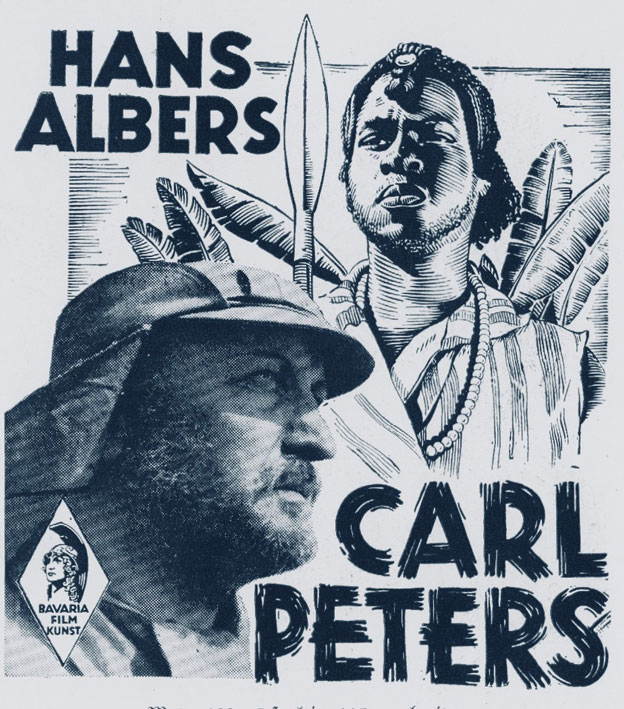
German Films Dot Net has an enormous amount of original film studio material on this banned propaganda film with anti–British and anti–semitic tendencies. The film starred perhaps Germany's most popular film star of the century – Hans Albers in the title role.
We hold four film posters from 1941/1945 in this Collection. One of the two original German film posters in the standard "A0" size, a text–only poster from the Protekorat (occupied former Czechoslovakia), and two very rare posters from the Occupied Eastern Territories (Riga, Latvia). All four posters are to be found in our Poster Gallery on this website.
We point out here that the text–only poster from German occupied Czechoslovakia with Carl Peters screenings on 22 – 23 March 1945 listed as a re-release. The town of Gaya Kyjov, where this movie theatre was located, was 376 Kilometers west of the city of Košice, where a "provisional Czechoslovak government" was established by the Soviets twelve days later, on 4 April 1945. "National committees" (supervised by the Red Army) took over the administration of towns as the Germans were expelled and the Red Army moved westwards. It may well be that Carl Peters was the very last German film shown in this cinema in WWII.
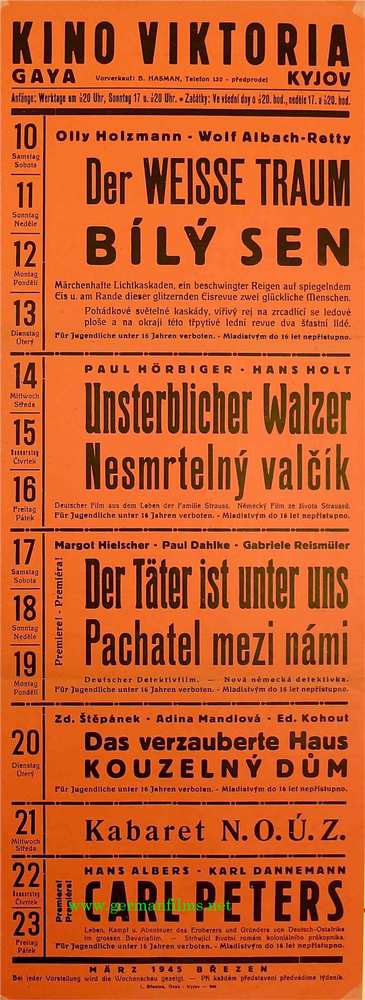
In addition to these posters, we have
-
the original press-book
-
the original cinema owners' promotion guide ("Werberatschlag")
-
56 B&W lobby cards and press photographs and two rare colour A4-sized (ca.9 x 12 inch) transparency sheets meant for display in a cinema foyer light box. We show those two "Dias" below.
BELOW, the film's press–book and cinema owners' promotion guide:
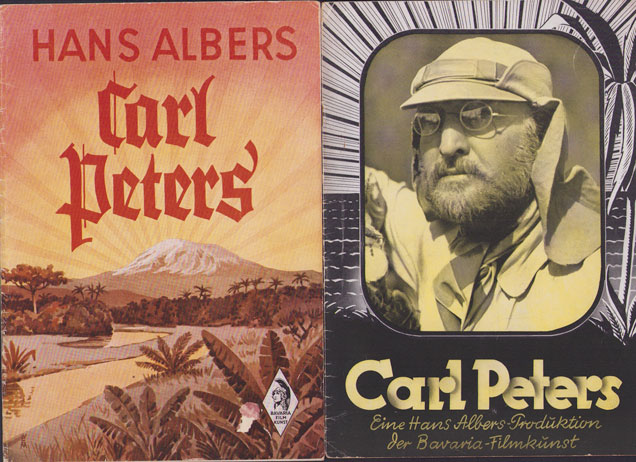
BELOW, the two rare colour transparency sheets of lobby cards:
The 1941 propaganda film Carl Peters was filmed in the sandy lands of Rügen, a German island in the Baltic Sea, meant to represent Africa, as well as the Bavaria Filmkunst film studio in München–Geiselgsteig and in the Barrandov studios in occupied Prague.
In his diary entry of October 20, 1937 Propaganda Minister Joseph Goebbels wrote that he had to read many film manuscripts, above all the one of a colonial film, “Karl Peters.” Thus, two years before Germany and Great Britain were at war, the story of this man was already under consideration.
Carl Peters (1856-1918), who undertook a private expedition to East Africa in 1884, acquired the core area of what later became German East Africa through treaties and obtained imperial protection for this area. He became Reich Commissioner in 1891 and returned to Germany in 1892. He was responsible for establishing all of Germany’s African colonial holdings. The Versailles Treaty took all of Germany’s colonies away and the film is strongly anti–British, similar to The Riders of German East Africa and Uncle Krüger.
The main role was played by Hans Albers, Germany’s leading film star, who appeared in over 100 silent films, and many dozens of sound films until 1960. He made nineteen films in the Third Reich, the last of which remained uncompleted in March 1945. Albers is perhaps best known to English-speaking audiences for his role as the big-mouthed strong man Mazeppa alongside Marlene Dietrich in her star-making classic Der blaue Engel / The Blue Angel or for his portrayal of Baron Münchhausen in the famous 1943 Ufa Agfacolor epic of the same name.
In the eyes of the German Colonial Bund movement established to restore German colonies after WWI, and during the Third Reich, Peters was championed as a true German hero thwarted by parliamentary intrigues of the Social Democrats, by scheming Jews in the Colonial Office inside Germany, and by the perfidious British overseas. The film was produced the same year as Ohm Krüger to promote anti-British sentiments after Hitler came to the conclusion that no separate peace with Britain was possible.
Post-war remarks about Peters are scathing: “The real Carl Peters – even outwardly a man compared to Albers - was an opaque fellow, described by historians as a psychopath, with sadistic tendencies, a pathological but exaggerated need for recognition and hysterical ambition that took the form of Caesar-like madness. Peter's male vanity, driven by arrogance and greed, was his downfall. In Africa, he was called "Mkono wa Damu", "the man with the bloody hands". In Berlin, he was given the name Hanging Peters. After a heated debate Reichstag, he was stripped of all his offices and dismissed from civil service.” (Wendtland, K-H; Geliebte Kintopp, Jhrg.1941–1942; 1987.). Post-1945 German statues, street names, park names, institutions, and other commemorations to Carl Peters have all disappeared down the proverbial Memory Hole.
Historically there really was a Jewish Director of the German Foreign Office, a baptised Paul Kayser, who hated Carl Peters. As portrayed in the film, Kayser only took over the colonial department because - as Peters explains to his friends - he senses a future here and wants to exploit it for himself instead of leaving it to up-and-coming German researchers. At the same time, Kayser is afraid of the English colonial power and therefore seeks rapprochement with Great Britain. The fact that the Jewish state official was accused of a policy that Hitler himself had pursued until recently, in an effort to gain England's tolerance, could have made the viewer suspicious. The film therefore pre–preemptively proves that Kayser has committed high treason: the Legation Council not only ensures that the brave Peter's first expedition is denied the protection of the Reich, but also puts the British secret service, with which he works, on their trail. (Hollstein, D; Antisemitische Filmpropaganda, 1971.)
BELOW, actor Herbert Hüpner portrayed Leon Kayser, the Jewish overseer of the Colonial Office, based on the historic Paul Kayser, and Carl Peter's nemesis.
According to fellow friend and actor Hubert von Meyerinck, Albers tried to avoid starring in overt Nazi propaganda films and in this, he mostly succeeded. However, the role of Carl Peters attracted him and he hoped to make it his own, but production was monitored by higher authorities and it was important that the script be followed exactly. Albers was politically compromised insofar as he had had a decades-long relationship with Jewish actress Hansi Burg. Propaganda Minister Dr. Joseph Goebbels forced them to split up because she was Jewish, although they remained in secret contact. During the Second World War, she lived in exile in Britain. They were reunited after the war.
The Film Plot
The story begins in London in 1892. Members of the British civil service in a club discuss Carl Peters, who has just crossed the English Channel with intelligence officers, wondering whether to stop Peters before he tries to achieve his objective and consolidate the position of the German Empire in East Africa.
Carl Peters returns to Germany to garner support, but his exploration projects are met with little response. He left on his own for Africa; and arrived in Zanzibar, where he tries to convince the German consulate to support his effort. He intends to establish a colony and make it a protectorate of the imperial government. Peters concludes commercial treaties with local tribal leaders, before the British or the Belgians manage to do so.
Carl Peters then survives a tropical disease and an attempted poisoning by the British Intelligence Service. He finally receives a letter from Kaiser Wilhelm I assuring protection for his colony.
Carl Peters returns to Africa and suffers through various trials, not only from the British, but also from the director of the Colonial Department of the German Foreign Office, who happens to be Jewish. Carl Peters escapes danger, but his friend Karl Ludwig Jühlke is a victim. While Peters leads his expedition to an end, bad news reaches him from Berlin. His ally Chancellor Bismarck must resign, but Peters is nonetheless appointed Reichskommissar (Commissioner of Colonies).
The enemy is also in Germany at home: Jews, traitors and the cursed Social Democrats. Back in Berlin, Peters must answer to the German people's elected representatives in the Reichstag and to respond to accusations of brutality by the Social Democratic Party of Germany (SPD). Peters openly calls for a global policy of colonialism and conquest, which he says will require issuing carte blanche to hard-hearted men like himself. He defends his policy of using execution without trial to prevent a native uprising, which, he insists, the parliamentarians could not have prevented.Despite the support of a witness in his favour, who is none other than a black Anglican Bishop, and despite the heated rhetoric that Peters uses, he is forced to resign. Peters falls victim to his many enemies and with it, the future of Germany.
Film Week magazine and cinema program comments
The fact that the intrepid fighter ultimately fails due to the lack of understanding and malice of his Jewish enemies should shock the viewer. The sentimental exit – Peters leaves the hall with tears in his eyes – declares the colonial pioneer the moral victor. "The mother, who always walked quietly next to him - proud of him, without making human claims on his path - was waiting for him in front of the Reichstag – in conversation with her he fights down his bitterness and his disappointment, – and the thought of his mission, the thought of Germany shines out even this bitter hour," wrote Ludwig Eylux in Filmwoche. (FW, Nr.25/26, 18.6.1941)
In the film’s Ufa cinema program, Peters’ accomplishments are hailed thusly: And what none of the well-equipped expeditions had managed to do, he succeeded. He had immediately recognized that Africa had become ripe – ripe through the British methods, which allowed Arab slave traders to exterminate entire Negro tribes and roam the interior of the black continent, robbing and plundering. Peters vigorously opposed these slave traders, and through the drum signals of the Negroes the news immediately spread throughout the country that a friend of the natives was approaching. Peters was able to do so within six weeks, despite a dangerous illness, conclude twelve treaties that secured him the acquisition of an area that was larger than the whole of Prussia - and his expedition had cost no more than 2,000 Deutsch Marks.
The film’s Director was Herbert Selpin, who made five sound films starring Albers. He also directed the anti-British WWI film The Riders of German East Africa in 1934. Filming began in September 1940.
BELOW: Hans Albers and director Herbert Selpin on location.
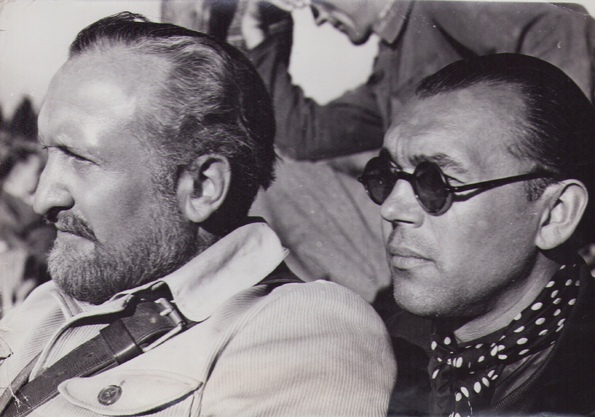
There were some 300 Africans in the film depicted as natives. Most were POWs, including African–American soldiers, and fifty German Africans who had residence in Germany due to their colonial service before the end of WWI. (Czinki, G; Repräsentation der Schwarzen im NS-Spielfilm 1934-1944 im Kontext der Geschichte, Bauhaus Universität Weimar thesis, 2004). In his diary entry of November 8, 1940 Dr. Goebbels remarked that “negroes out of imprisonment work on [the film.]. The poor devils are lined up and shiver from the cold and fear.”
The film premiered in Hamburg on March 21, 1941. One day before the premiere was the first time the public learned about the formation of the German Africa Corps; On March 20, Hitler awarded the commanding general of the corps, Lieutenant General Erwin Rommel, with the Oak Leaves Knight's Cross. The film only opened in Berlin on May 29, 1941 at a time when the political press was concerned with the conquest of Crete and the fighting in North Africa. The NSDAP’s newspaper Völkischer Beobachter, praised the film because "it quite happily contributes to the promotion of colonial ideas among the German people." (VB #151, 31.5.1941)
The film's premiere in Berlin at the prestigious Ufa–Palast–am–Zoo:
Film banned after 1945
The victorious Allies banned the film. It was not released by the Voluntary Self-Control censorship board (FSK) after 1945 but was shown on German television on February 6, 1980. Pirated copies of the film are undoubtedly copies of the TV broadcast.
